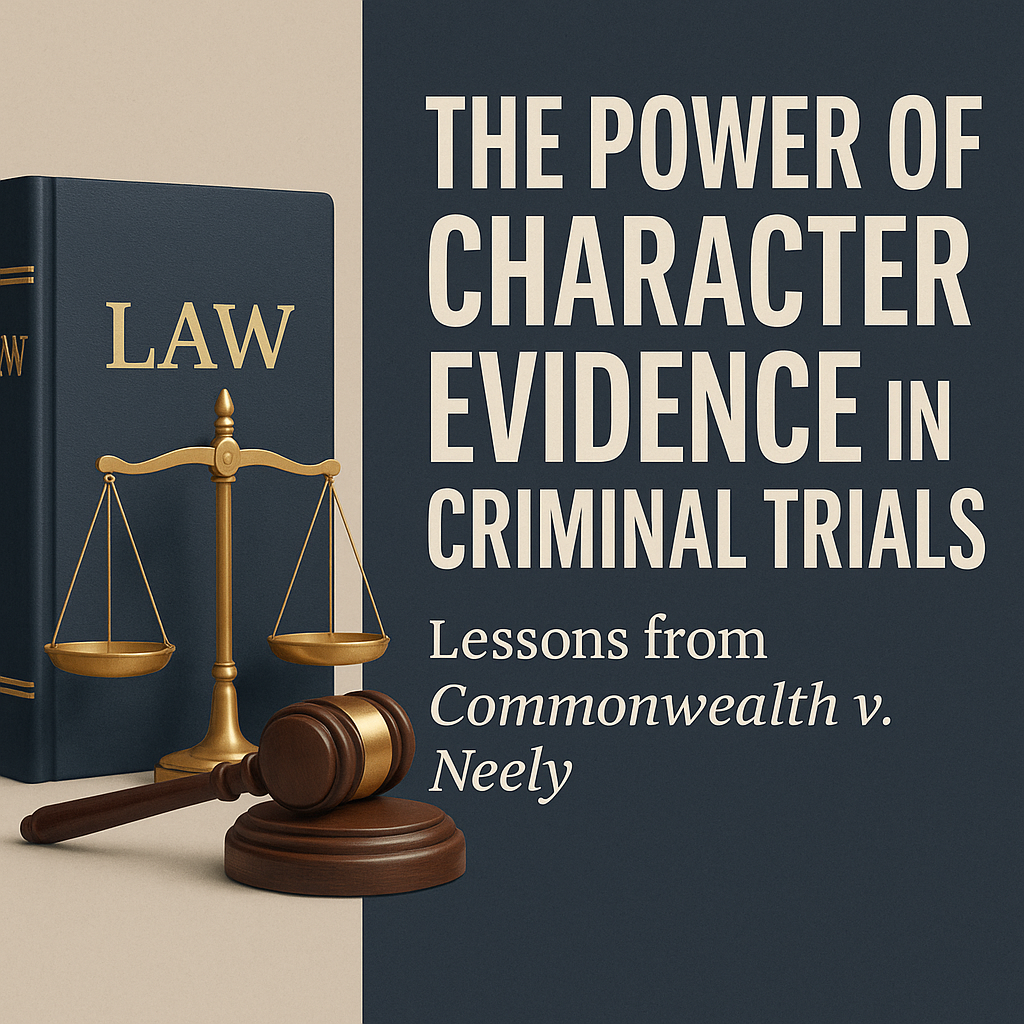The Power of Character Evidence in Criminal Trials: Lessons from Commonwealth v. Neely
June 8, 2025
 Commonwealth v. Neely 522 Pa. 236,561 A.2d 1
Commonwealth v. Neely 522 Pa. 236,561 A.2d 1
The Power of Character Evidence in Criminal Trials: Lessons from Commonwealth v. Neely
In the landscape of criminal defense, character evidence can sometimes be the strongest shield a defendant has. The Pennsylvania Supreme Court made that crystal clear in Commonwealth v. Neely, 522 Pa. 236 (1989), when it reaffirmed a longstanding and powerful principle: evidence of a defendant’s good reputation alone may create reasonable doubt and justify an acquittal.
This case is a reminder to defense attorneys, trial courts, and prosecutors alike that character evidence is not a mere formality. It is substantive, constitutionally significant evidence that juries are entitled to weigh fully and independently.
Case Background
James Neely was convicted by a jury of recklessly endangering another person and possessing an instrument of crime. At trial, Neely presented two highly credible character witnesses—Gregory A. Coleman, Chief of Staff for Philadelphia City Council, and Bernard Brown, a recreation supervisor—who testified to his strong reputation as a peaceful and law-abiding citizen.
At the close of trial, defense counsel requested a jury instruction aligned with Pennsylvania’s Suggested Standard Criminal Jury Instruction § 3.06(3):
“Evidence of good character may by itself raise a reasonable doubt of guilt and justify a verdict of not guilty.”
The trial judge refused to give that instruction. Instead, the court issued a more generic statement that character evidence was "material and essential testimony." When defense counsel objected, the judge candidly admitted, "I am trying to change the law of Parks [referring to precedent], I think it's wrong."
The Superior Court affirmed the conviction, but the Pennsylvania Supreme Court reversed—emphatically.
The Supreme Court’s Holding
The Court held that the trial court erred by refusing to instruct the jury that character evidence, by itself, may create reasonable doubt and lead to acquittal. This wasn’t a new rule. Rather, the Court pointed to a consistent line of Pennsylvania authority going back over a century:
Commonwealth v. Cleary, 135 Pa. 64 (1890): “Evidence of good character... may of itself, by the creation of a reasonable doubt, produce an acquittal.”
Commonwealth v. Stoner, 265 Pa. 139 (1919): “Good character... may, in itself, in spite of evidence to the contrary, raise a reasonable doubt...”
Commonwealth v. Scott, 496 Pa. 188 (1981): A defendant is entitled to an instruction that character evidence alone may be sufficient to raise reasonable doubt.
In Neely’s case, the trial court not only ignored this precedent but attempted to unilaterally revise it from the bench—something the Supreme Court unequivocally rejected.
Why This Decision Matters
The Court’s opinion was not just a technical correction. It was a strong defense of a principle deeply embedded in Pennsylvania criminal law: reputation matters. The opinion is filled with historical and literary references reinforcing the idea that a good name carries evidentiary weight. This isn’t mere tradition; it’s a recognition of the human reality that most people don’t commit crimes out of the blue—and juries are entitled to consider that.
This ruling reestablishes several key takeaways for trial practice:
1. Character Evidence Is Substantive, Not Supplemental
Character testimony is not simply a “bonus” or filler. It is affirmative evidence that the jury must be allowed to consider just as seriously as any forensic or eyewitness evidence.
2. A Specific Jury Instruction Is Mandatory
When character evidence is offered, the defendant is entitled to a charge that it may, by itself, raise reasonable doubt and justify acquittal. A generic reference to its “importance” or “relevance” is not enough.
3. Trial Courts Cannot Override Precedent
The opinion directly rebukes trial judges who seek to “improve” the law by rewriting established standards. Even if the judge personally disagrees with the principle, they are bound to follow it.
Strategic Takeaways for Defense Attorneys
If you're preparing for trial in Pennsylvania and have credible character witnesses, this case is a powerful tool in your arsenal. Be prepared to:
Cite Neely when requesting a jury charge on character evidence.
Emphasize the standalone probative value of a good reputation.
Object on the record if the trial court omits or downplays the required instruction.
Preserve the issue for appeal by referencing Neely, Scott, and Cleary.
Character evidence is particularly valuable in cases where physical evidence is limited, the defendant has no prior record, and the prosecution’s case hinges on credibility or circumstantial interpretation.
Conclusion
Commonwealth v. Neely is more than a procedural ruling—it’s a reaffirmation of dignity, humanity, and fairness in criminal trials. In an age of surveillance, data, and high-tech forensics, the Supreme Court reminded us that sometimes, a person’s good name—their lifetime of reputation—is the most powerful evidence they have.
It must not only be heard.
It must be respected.

